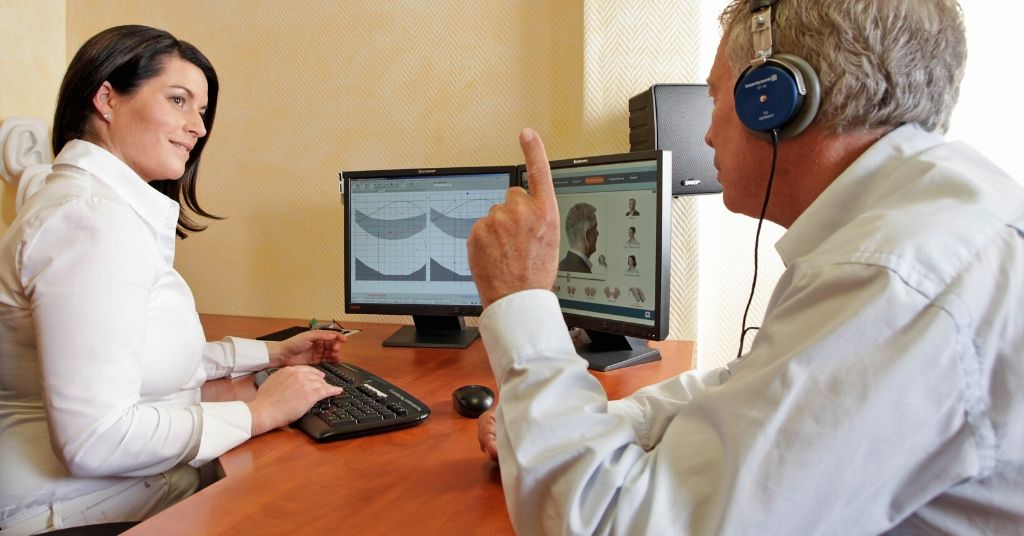
Do you know about this deaf professional tennis player?
August 30, 2018
Ask Anna: Can my hard of hearing child wear headphones on the airplane?
September 5, 2018Who is impacted by hearing loss and dementia?

The headline is alarming. “A Minor Hearing Loss Now Can Mean Major Dementia Risk Later.” The Healthline subhead is no less reassuring: “Even a subtle loss of hearing when you’re young can change brain function and increase the risk for dementia.”
Whoa. What does this mean for those of us who are young and have a non-age related hearing loss? What if we have a hearing aid or cochlear implant? Should we be worried about being impacted by the relationship between hearing loss and dementia?
Lee’s Study
Until now, studies related to hearing loss and dementia focused on older adults.
Read more: Are hearing loss and dementia linked?
Then Yune S. Lee, PhD, assistant professor of speech and hearing science at The Ohio State University, conducted a study to see how the brain reacts to complex and simple sentences. Participants were between the ages of 18 and 41.
To prepare for the study, everyone had his or her hearing tested. Lee’s team discovered that people who had lost even small amounts of hearing had unusual activity in their right frontal cortex – noticeable even on MRI tests. This was significant because the right side doesn’t really start working until age 50.
Lee speculated that people with hearing loss might put so much effort into listening that they start to drain their cognitive resources, which would otherwise be used for memory and attention. Thus, his claim that “people with mild hearing loss are twice as likely to be diagnosed with dementia.”
Questions about hearing loss and dementia
What about a severe or profound hearing loss? Lee says a severe hearing loss is five times more likely to develop dementia, according to Frank R. Lin, MD, et al., who published “Hearing Loss and Incident Dementia” in Arch Neurol (Feb 2011).
Does the degree of risk change if hearing devices like hearing aids or cochlear implants are used?
Lee isn’t aware of any study addressing this question, but says, “HAs and CIs should help alleviate listening burdens, thereby preventing cognitive draining.”
This points to the importance of treating hearing loss and providing auditory stimulation, says Stacey Carroll, PhD, ANP-BC, a Geri-psych nurse practitioner who happens to be deaf. “It’s unknown whether having periods of unaided time would give a break from listening burdens or would be detrimental,” she adds.”
Clearly, more research needs to be done in this arena. In an article entitled “Hearing Loss & Dementia – Who’s Listening?” published in Aging Mental Health (August 2014), there’s a section that reads:
“While it is possible that hearing rehabilitative therapies and devices could plausibly lessen cognitive load, provide increased auditory stimulation, and promote social engagement, there has been no research that has investigated whether such therapies could actually reduce the risk of cognitive decline and dementia.”
The section continues to explain how epidemiologic studies have not given clear results on the effects of hearing aid use.
“Individuals with hearing impairment who choose to use hearing aids and other technologies are likely to be healthier and of higher socioeconomic status (creating a positive bias of seeing a protective effect) but at the same time are also likely to have more severe hearing problems (leading to a negative bias) than individuals with hearing impairment who don’t use hearing aids.”
Does it matter when the hearing loss occurs?
Would a congenital hearing loss have the same risk? Lee says probably not, because “the deaf population is inherently adapted to the non-auditory environment.” The problem is, this statement is debatable for those who were aided early and/or then implanted.
“Would a congenital hearing loss have the same risk? Lee says probably not, because ‘the deaf population is inherently adapted to the non-auditory environment.'”
Of course, other factors presumably come into play, like genetics, socio-economic status, etc. “However, we cannot firmly say that any of these must lead to dementia (including our findings),” says Lee. “So, the caution should be made to interpret.” In other words, the cause is unknown. We know there’s some relationship but haven’t teased out the reason.
“There seems to be a correlation, but we don’t really have any idea about cause or effect at this point,” says Carroll. “We also still don’t really know what causes many types of dementia, so this is an added complexity.”
Future Research
Lee plans to study other populations, like construction workers, airport employees, nightclub DJs, etc., to see if more insights can be gleaned into the connection between hearing loss and dementia.
In the meantime, healthcare providers need to focus on hearing loss as a priority when evaluating someone with suspected dementia. P. Murali Doraiswamy, MD, professor of psychiatry and medicine at Duke University’s School of Medicine and co-author of “The Alzheimer’s Action Plan”, says in an AARP article that this is a big missed opportunity. He also says that the link between hearing loss and milder cognitive problems is becoming increasingly accepted. He points out that the benefits of correcting hearing loss on cognition are twice as large as the benefits of any cognition-enhancing drugs on the market and should be the first thing medical professionals focus on.
Doraiswamy also says that we need long-term controlled trials looking at whether cochlear implants can delay the onset of dementia in at-risk subjects, “which will clinch the case.”
Bottom line, what you should know
Hearing loss affects the brain structure and cognitive load, and many people isolate themselves socially. But if hearing loss occurs at a younger age and is identified early as well, resulting in HAs and/or CIs, theoretically, this should mean that the risk of dementia isn’t quite as high as the Healthline headline makes it seem.
Do you think you are at risk of hearing loss? Here’s what you can do.



